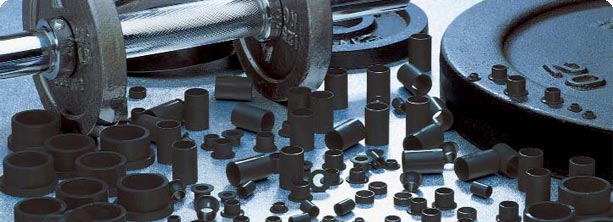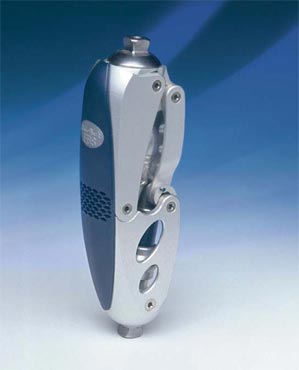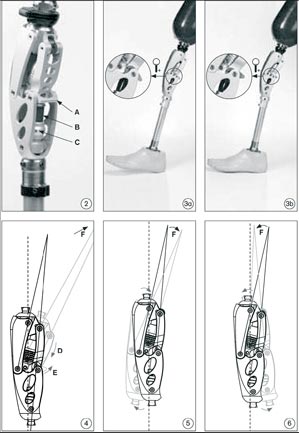
Patient's welfare in focus
How polymer bearings improve an artificial jointThe Otto Bock Health Care GmbH, a leading worldwide supplier of orthopedic technology since 90 years, offers sophisticated, top-quality products and services to people with restricted mobility. By the use of iglidur® bearings instead of needle and bronze bearings, the artificial knee joint "3R60 EBS" (EBS: Ergonomic Balanced Stride) could be further developed. The metallic machine elements prove to be susceptible to dust and dirt and with increased play, develop disturbing noise and frictional corrosion in small pivoting movements. The latter can endanger the wearer of the artificial limb by blockade of the axles. Challenge in design improvement: The replaced bearing should operate free of maintenance and play and possess only a low wear. Moreover they should run noiseless, cushion impacts and thereby have a good cost/performance ratio.
Now the bearings of the W300 type and iglidur® Q are seated in all bearing points of the artificial knee joint.

"EBS" knee joint
All representatives of the iglidur® W300 family provide for particularly high holding times, low coefficients of friction and extremely high abrasion resistance. They are also suitable for soft shafts and withstand chemicals. iglidur® W300 shows a very high compressive strength despite high elasticity. Under the maximum permitted load of 60 MPa, the deformation at room temperature is less than 3 percent. The coefficients of friction also do not increase with higher surface speeds. Therefore compared to other materials it can achieve slightly higher surface speeds, for instance up to 1.5 m/s rotating and up to 5 m/s linear. Due to the extraordinary wear resistance, the bearing wear remains low also in long-term application with high speeds. This is applicable especially for hardened, not so smooth shafts.
The coefficients of glide friction of the iglidur® W300 decreases with increasing load. In the dry operation, compared to steel (Cf53), they only reduce by around 25 percent in loads between 0.5 and 3.5 MPa. In contrast to the other iglidur® materials, the coefficient of friction remains constantly low also in higher peripheral speeds. Friction and wear also depend to a high degree on the parallel partner. Very smooth shafts increase the coefficient of both friction and wear. Moreover smooth shafts can lead to stick-slip effects. The negative effect is mostly the squeaking noise. For minimum coefficients of friction with iglidur® W300, the surface should not be too smooth.

If very high loads are stated, the iglidur® Q bearings are recommended. They were developed specially for extreme loads. This material figures among the iglidur® materials that by far display the best wear resistance under high loads.
From a radial load of 25 MPa, they even surpass bearings made of the highly abrasion-resistant iglidur® W300. Specific solid lubricants, integrated in the material in an extremely fine way, take care that the maintenance-free dry operation is guaranteed under any load. Under the maximum permitted load of 100 MPa, the elastic deformation at room temperature is less than 3 percent. The iglidur® Q products indeed show the greatest advantages with high loads and low speeds. Due to their excellent coefficients of friction, high surface speeds too are possible.
The iglidur® Q bearings retain their excellent wear resistance in high temperatures as well. The upper long-term application temperature lies at 135 °C. At the same time the iglidur® Q surpasses many dry-running plastic bearings, which exhibit reduced coefficients of friction with increased loads.
Conclusion
The artificial limb is now lighter and smooth-running. The patient need visit the orthopedic mechanic only very seldom.